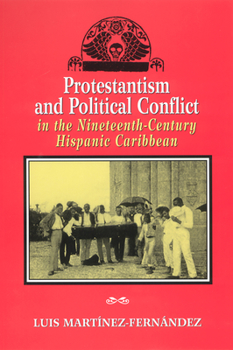< Back to Search Results
Protestantism and Political Conflict in the Ninteenth-Century Hispanic Caribbean
Select Format
Select Condition 
Book Overview
Catholicism has long been recognized as one of the major forces shaping the Hispanic Caribbean (Cuba, Puerto Rico, and the Dominican Republic) during the nineteenth century, but the role of Protestantism has not been fully explored . Protestantism and Political Conflict in the Nineteenth-Century Hispanic Caribbean traces the emergence of Protestantism in Cuba and Puerto Rico during a crucial period of national consolidation involving both social and political struggle. Using a comparative framework, Martínez-Fernández looks at the ways in which Protestantism, though officially "illegal" for most of the century, established itself, competed with Catholicism, and took differing paths in Cuba and Puerto Rico. One of the book's main goals is to trace the links between religion and politics, particularly with regard to early Protestant activities. Protestants encountered a complex social, economic, and political landscape both in Cuba and in Puerto Rico and soon found that their very presence, coupled with their demands for freedom of worship and burial rights, involved them in a series of interrelated struggles in which the Catholic Church was embroiled along with the other main forces of the period--the peasantry, the agrarian bourgeoisie, the mercantile bourgeoisie, and the colonial state. While the established Catholic Church increasingly identified with the conservative, pro-slavery, and colonialist causes, newly arrived Protestants tended to be nationalistic and to pursue particular economic activities--such as cigar exportation in Cuba and the sugar industry in Puerto Rico. The author argues that the early Protestant communities reflected the socio-cultural milieus from which they emerged and were profoundly shaped by the economic activities of their congregants. This influence, in turn, shaped not only the congregations' composition, but also their political and social orientations.
Format:Paperback
Language:English
ISBN:0813529948
ISBN13:9780813529943
Release Date:January 2002
Publisher:Rutgers University Press
Length:264 Pages
Weight:1.00 lbs.
Dimensions:0.7" x 6.1" x 9.1"
Customer Reviews
0 rating





